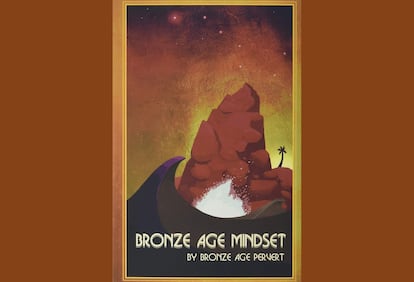The United States’ ultra-right has a new hero
He hates feminism and democracy and has dubbed himself Bronze Age Pervert. He moves the masses and is adored by Trump

The new hero of the ultra-conservative blogosphere is Bronze Age Pervert, a masked crusader who operates with absolute impunity on social media networks like X. From these platforms, he proclaims that Donald Trump is not only the legitimate president of the United States, but the entire “civilized universe of Greco-Latin heritage,” and praises tennis player Novak Djokovic as the last stronghold of uncontaminated masculinity and messenger of the “supremacy of the Slavic man.”
Publications like Bloomberg, National Review and Politico have echoed the most recent provocations of this metallic deviant, and raised alarm over the shocking success of his only book to date, the self-published Bronze Age Mindset, a “manual of resistance against political correctness” that, apparently, has become bedtime reading for the leading ideologues of the United States’ radical right.
Rosie Gray, a Politico writer who has been on the trail of Bronze Age Pervert since he first hit the internet five years ago, posits that the man behind the digital mask is none other than Costin Alamariu, an obscure Romanian-born philosophy graduate who just turned 43. Alamariu was building something of a reputation as an intellectual supporter of the authoritarian right, from Viktor Orbán to Narendra Modi to Jair Bolsonaro, when he disappeared from the map in October 2018. Since then, there’s been no sign of Alamariu, who might have opted, according to Rose, to “renounce his civilian identity and bet on his successful avatar,” a kind of bethroned bodybuilder who abhors feminism, detests democracy and has a curious obsession with naked male torsos.
Graeme Wood, a collaborator at The Atlantic, has delved a bit deeper into Alamariu’s peculiar personality. According to Wood, at the age of 17, the young Romanian, who was then based in Boston, took part in a comical act of boycotting an exhibition of Chinese ceremonial art that was being held in one of the city’s museums. Alamariu and two classmates, future The Office actors John Krasinski and B.J. Novak, managed to replace the exhibit’s audio guide with a homemade tape on which they made comments like, “I wish we had a hammer to smash this abhorrent work to smithereens.” Novak confessed to the scandal years later and added that he remembered Alamariu as a strange guy with very original ideas, although he “was not quite in his right mind.”
By all indications, the man retains the qualities he possessed at 17 and, moreover, has preserved in his vocation as a multiformat cultural agitator. Gray reconstructs in broad strokes the personal history of this strange individual: he came to the United States with his family when he was 10 years old, he was a brilliant student at prestigious universities like Columbia and Yale, began to frequently attend extreme right gatherings and discussion groups and always had a distinct interest in the philosophy of Nietzsche, Ancient Greece, the “values of Western civilization,” eugenics and antisemitism. A former classmate at Yale claims that even in his youth, Alamariu aspired to “become a kind of right-wing Slavoj Źiźek.” That is to say, a respected and influential intellectual, but with a popular, rock star side. For the time being, his plan for world domination has led him to go underground online and create a somewhat extreme and cartoonish character, one that is ideal for this era of sectarian and frankly unhinged politicization.
Trump follows him online. And some of his advisors have found in Alamariu the perfect acrobat to keep the circus going.
Sign up for our weekly newsletter to get more English-language news coverage from EL PAÍS USA Edition
Tu suscripción se está usando en otro dispositivo
¿Quieres añadir otro usuario a tu suscripción?
Si continúas leyendo en este dispositivo, no se podrá leer en el otro.
FlechaTu suscripción se está usando en otro dispositivo y solo puedes acceder a EL PAÍS desde un dispositivo a la vez.
Si quieres compartir tu cuenta, cambia tu suscripción a la modalidad Premium, así podrás añadir otro usuario. Cada uno accederá con su propia cuenta de email, lo que os permitirá personalizar vuestra experiencia en EL PAÍS.
¿Tienes una suscripción de empresa? Accede aquí para contratar más cuentas.
En el caso de no saber quién está usando tu cuenta, te recomendamos cambiar tu contraseña aquí.
Si decides continuar compartiendo tu cuenta, este mensaje se mostrará en tu dispositivo y en el de la otra persona que está usando tu cuenta de forma indefinida, afectando a tu experiencia de lectura. Puedes consultar aquí los términos y condiciones de la suscripción digital.









































